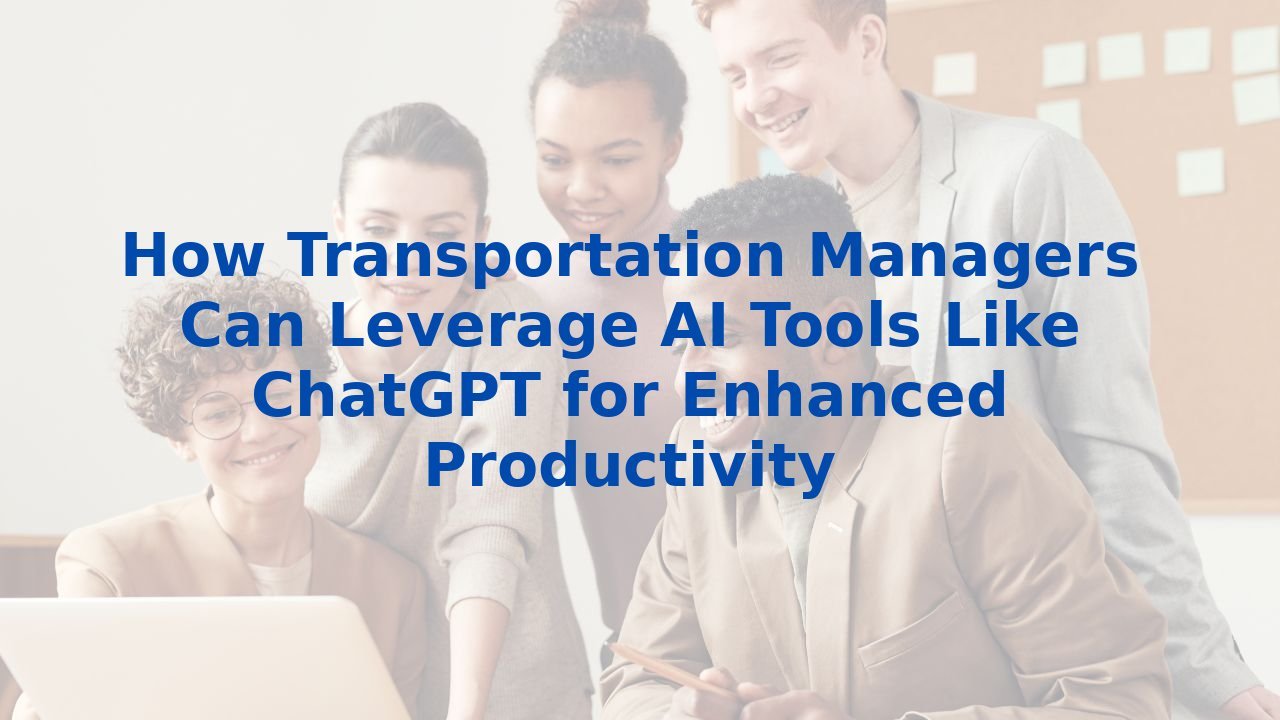How Transportation Managers Can Leverage AI Tools Like ChatGPT for Enhanced Productivity
In the fast-paced world of logistics and transportation, efficiency is not just a goal; it’s a necessity. Transportation Managers are at the heart of ensuring that operations run smoothly, from route planning to customer satisfaction. The advent of Artificial Intelligence (AI), specifically ChatGPT and other AI tools, is revolutionizing how Transportation Managers approach their daily tasks. Those who harness the power of AI will find themselves not just surviving, but thriving in this competitive landscape.
Transform Your Workflow with ChatGPT
Imagine a world where scheduling, dispatching, and customer service operate like clockwork. This isn’t a far-off dream; it’s achievable through AI. ChatGPT, an advanced language model developed by OpenAI, can handle a plethora of tasks that traditionally consume a significant amount of time and resources. Here’s how:
Efficient Communication
ChatGPT excels in language processing, making it a powerful ally for communication tasks. Whether it’s drafting emails, generating standard responses to frequent customer inquiries, or even managing social media interactions, ChatGPT can take over these duties, freeing up your time for more strategic activities.
Data-Driven Decisions
AI tools like ChatGPT can analyze vast amounts of data quickly and accurately. Transportation Managers can leverage this capability to gain insights into traffic patterns, fuel consumption, and delivery timelines, enabling more informed decision-making. By utilizing AI for data analytics, managers can identify inefficiencies and implement corrective measures proactively.
Practical Uses of ChatGPT for Transportation Managers
Scheduling and Dispatching
ChatGPT can automate the scheduling of deliveries and dispatches by analyzing the optimal routes and times. It can take into account variables such as traffic conditions, weather forecasts, and vehicle availability, producing a more efficient schedule that minimizes delays and maximizes productivity.
Customer Support
Customer inquiries can range from simple tracking requests to complex service issues. ChatGPT can serve as the first line of support, handling routine questions and escalating more complicated issues to human agents. This ensures timely customer service and improves overall customer satisfaction.
Inventory Management
Managing inventory effectively is crucial in the transportation sector. ChatGPT can assist by monitoring stock levels, predicting future needs based on historical data, and even placing orders to replenish supplies. This reduces the risk of stockouts and overstock situations.
Effective Prompts for Using ChatGPT
To fully exploit ChatGPT’s capabilities, it’s essential to use well-crafted prompts. Here are a few examples:
Optimizing Routes
Prompt: "Based on the current traffic and weather conditions, generate the most efficient delivery route for the following locations."
Generating Reports
Prompt: "Create a weekly report summarizing delivery times, fuel consumption, and any delays encountered."
Customer Interaction
Prompt: "Generate a response to a customer inquiry regarding the status of their delivery."
Other AI Tools for Transportation Managers
Route Optimization Software
There are AI-powered route optimization platforms specifically designed for the logistics industry. These tools analyze various factors to suggest the most efficient routes, helping to cut down on fuel costs and delivery times.
Predictive Maintenance Tools
AI-driven maintenance tools can predict when a vehicle is likely to require servicing based on usage patterns and historical data. This proactive approach can help avoid breakdowns and save costs on emergency repairs.
The Future of AI in Transportation Management
While AI is already making waves in the transportation sector, its potential is far from fully realized. Here are some future applications:
Autonomous Vehicles
The rise of self-driving trucks and delivery drones powered by AI promises to revolutionize logistics. These technologies can operate around the clock without the need for breaks, increasing efficiency and reducing labor costs.
Advanced Predictive Analytics
As AI algorithms become more sophisticated, they will be able to provide even more accurate predictions. This includes anticipating customer demand, optimizing warehouse space, and predicting economic impacts on transportation routes.
Why Learning AI is Crucial for Transportation Managers
The transportation industry is undergoing a digital transformation, and those who fail to adapt risk falling behind. By embracing AI, Transportation Managers can enhance their efficiency and productivity exponentially. Here's why:
Adapt or Be Left Behind
The adage "AI won't take your job, but someone who uses AI will" holds particularly true in this industry. Managers who leverage AI tools will be able to accomplish more in less time, making them invaluable assets to their organizations.
Increased Earning Potential
Efficiency and productivity are directly linked to profitability. By using AI to streamline operations, Transportation Managers can reduce costs and boost revenue, making their roles more financially rewarding.
Are you looking for over 15 different ways Transportation Managers can use AI, 1000s of additional prompts to support you with your work, video training and more? Complete AI Training supports Transportation Managers to learn AI and to always be up to date on AI. Check out our course. Also refer to our book that's available on Amazon Kindle: here and Amazon Paperback: here.



